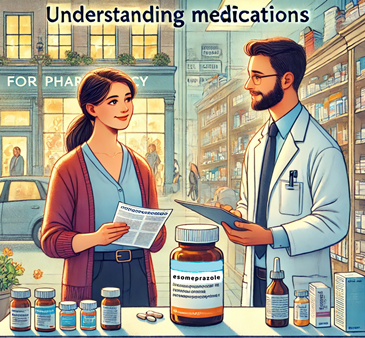by Admin
Share

A Restful Night: Finding the Right Medication for Insomnia
Samantha had been struggling with insomnia for months. Every night, she would lie in bed, staring at the ceiling, unable to drift off. Her days were filled with exhaustion, and her performance at work was starting to suffer. Desperate for relief, she decided to visit her local pharmacy.
“Hi, I’m Samantha. I’ve been having terrible insomnia for months now, and I really need something to help me sleep,” she explained to Michael, the pharmacist.
Michael nodded sympathetically. “I understand, Samantha. Insomnia can be really tough. Let’s go over some options.”
Michael began by explaining the different classes of medications available. “We have benzodiazepines like Temazepam and Triazolam, but they come with risks of dependence and cognitive impairment. Then, there are non-benzodiazepine hypnotics like Zolpidem and Eszopiclone. They are effective but can also cause dizziness and gastrointestinal issues.”
Samantha looked concerned. “I’ve heard about those, but I’m worried about becoming dependent on them.”
“That’s a valid concern,” Michael agreed. “We also have melatonin receptor agonists, like Ramelteon, which mimic your natural sleep hormone. They’re generally well-tolerated with fewer side effects.”
“That sounds better,” Samantha said, feeling a bit more hopeful.
“There are also orexin receptor antagonists like Suvorexant and Lemborexant,” Michael continued. “They work differently by inhibiting wakefulness. They can be effective for both falling and staying asleep but may cause daytime sleepiness.”
Samantha was intrigued. “I’ve never heard of those before.”
“Lastly, some antidepressants, like Doxepin in low doses, can help with sleep maintenance. Antihistamines like Diphenhydramine and Doxylamine are available over-the-counter but aren’t recommended for long-term use due to side effects like dry mouth and next-day sedation.”
Samantha sighed. “There are so many options. How do I know which one is right for me?”
Michael smiled reassuringly. “Let’s consider your specific needs and medical history. Are you having trouble falling asleep, staying asleep, or both?”
“Mostly staying asleep,” Samantha replied. “I wake up in the middle of the night and can’t go back to sleep.”
“Given that, I’d recommend trying Eszopiclone or Ramelteon. Eszopiclone can help with both sleep onset and maintenance, while Ramelteon is great if you want to avoid the risk of dependence.”
Samantha nodded. “I think I’d like to try Ramelteon first. I’m cautious about the risk of dependence.”
“That’s a good choice,” Michael said. “I’ll get that ready for you. Just remember, it might take a few nights to start working. If you don’t see improvement, we can revisit and consider Eszopiclone.”
Samantha thanked Michael and took the prescription home. That night, she took the first dose of Ramelteon, hopeful but wary. She went through her usual bedtime routine and slipped into bed.
To her surprise, she felt a gentle wave of drowsiness wash over her. For the first time in months, she fell asleep quickly and stayed asleep through the night. When she woke up, she felt refreshed and rested.
Over the next few weeks, Samantha’s sleep continued to improve. She felt more energetic during the day, her work performance bounced back, and she regained her zest for life.
On her next visit to the pharmacy, Samantha thanked Michael profusely. “I can’t tell you how much better I feel. Thank you for helping me find the right medication.”
Michael smiled. “I’m glad to hear that, Samantha. Remember, managing insomnia can be a journey, and it’s important to find what works best for you. If you have any questions or need further adjustments, we’re always here to help.”
With a grateful heart, Samantha walked out of the pharmacy, knowing she had finally found the restful sleep she had been longing for, thanks to the careful guidance of her pharmacist.
Medications for Insomnia: A Pharmacist’s Guide
Insomnia is a common sleep disorder affecting millions worldwide, characterized by difficulty falling asleep, staying asleep, or both. As pharmacists and pharmacy technicians, understanding the pharmacological options for insomnia is crucial for providing optimal patient care. This blog post will delve into the mechanism of action, side effects, commonly prescribed medications, and dosing for insomnia.
Mechanism of Action
- Benzodiazepines: Enhance the effect of GABA at the GABA-A receptor, leading to increased neuronal inhibition and sedative effects.
- Non-Benzodiazepine Hypnotics (Z-drugs): Act on the GABA-A receptor, promoting sedation without broader anxiolytic and muscle relaxant effects.
- Melatonin Receptor Agonists: Mimic melatonin by binding to MT1 and MT2 receptors, regulating the sleep-wake cycle.
- Orexin Receptor Antagonists: Inhibit orexin, a neuropeptide that promotes wakefulness, thus facilitating sleep.
- Antidepressants: Some have sedative properties through histamine H1 receptor antagonism and serotonin reuptake inhibition.
- Antihistamines: Block histamine H1 receptors, leading to sedative effects as histamine plays a role in wakefulness.
Side Effects
- Benzodiazepines: Drowsiness, dizziness, cognitive impairment, dependence, withdrawal symptoms.
- Non-Benzodiazepine Hypnotics (Z-drugs): Dizziness, headache, gastrointestinal disturbances, lower risk of dependence than benzodiazepines.
- Melatonin Receptor Agonists: Dizziness, fatigue, somnolence.
- Orexin Receptor Antagonists: Daytime sleepiness, headache, abnormal dreams.
- Antidepressants: Varies by drug, can include dry mouth, weight gain, constipation, sedation.
- Antihistamines: Dry mouth, urinary retention, blurred vision, constipation, next-day sedation.
Commonly Prescribed Medications
- Benzodiazepines
- Temazepam (Restoril): 7.5 mg to 30 mg at bedtime. Short-term use recommended.
- Triazolam (Halcion): 0.125 mg to 0.25 mg at bedtime. Useful for sleep initiation.
- Non-Benzodiazepine Hypnotics (Z-drugs)
- Zolpidem (Ambien): 5 mg to 10 mg immediately before bedtime. For extended-release, 6.25 mg to 12.5 mg.
- Eszopiclone (Lunesta): 1 mg to 3 mg at bedtime. Starting dose is 1 mg, can increase to 3 mg.
- Zaleplon (Sonata): 5 mg to 10 mg immediately before bedtime. Maximum dose is 20 mg per night.
- Melatonin Receptor Agonists
- Ramelteon (Rozerem): 8 mg within 30 minutes before bedtime. Avoid high-fat meals around dosing.
- Orexin Receptor Antagonists
- Suvorexant (Belsomra): 10 mg within 30 minutes before bedtime. Can increase to 20 mg.
- Lemborexant (Dayvigo): 5 mg once per night before bedtime. Can increase to 10 mg.
- Antidepressants
- Doxepin (Silenor): 3 mg to 6 mg within 30 minutes before bedtime. Higher doses not recommended for insomnia.
- Trazodone: Off-label, 25 mg to 100 mg at bedtime.
- Antihistamines
- Diphenhydramine (Benadryl): 25 mg to 50 mg 30 minutes before bedtime. Not for long-term use.
- Doxylamine (Unisom): 25 mg 30 minutes before bedtime. Similar considerations as diphenhydramine.
Conclusion
Understanding the pharmacological treatment of insomnia is essential for pharmacists and pharmacy technicians. Each class of medication offers distinct mechanisms of action, benefits, and side effect profiles. Tailoring treatment to individual patient needs and monitoring for adverse effects ensures safe and effective management of insomnia. Always stay updated on the latest guidelines and emerging therapies to provide the most current and effective care for your patients.
By staying informed and engaged, pharmacists and pharmacy technicians can make a significant difference in the lives of those struggling with insomnia. Providing comprehensive counseling, considering the individual’s complete medical history, and being vigilant about potential drug interactions and side effects are key components of effective treatment. Additionally, incorporating non-pharmacological approaches, such as cognitive behavioral therapy for insomnia (CBT-I) and sleep hygiene education, can further enhance treatment outcomes.
Remember, the goal is not just to prescribe a medication but to ensure a holistic approach that promotes overall well-being and long-term health. With your expertise and compassionate care, you can help patients achieve the restful sleep they need to thrive.
Medications for Seasonal Allergies: A Comprehensive Guide for Pharmacists and Pharmacy Technicians Seasonal allergies, also known as hay fever or allergic rhinitis, are a common condition that affects millions of people worldwide. As pharmacists and pharmacy technicians, understanding the medications used to manage these allergies is essential to provide optimal patient care. This blog post […]
A Foot to Stand On: A Journey to Finding the Right Medication for Athlete’s Foot Jake had been battling a persistent itch between his toes for weeks. At first, he thought it was just dry skin, but the red, scaly patches and constant burning sensation told a different story. As a gym enthusiast, he knew […]
A Journey to Heartburn Relief Emma had been struggling with heartburn for months. The burning sensation in her chest was relentless, especially after meals or when she tried to sleep. She was desperate for relief and had tried various over-the-counter medications, but nothing seemed to work for long. One evening, after another painful bout […]





